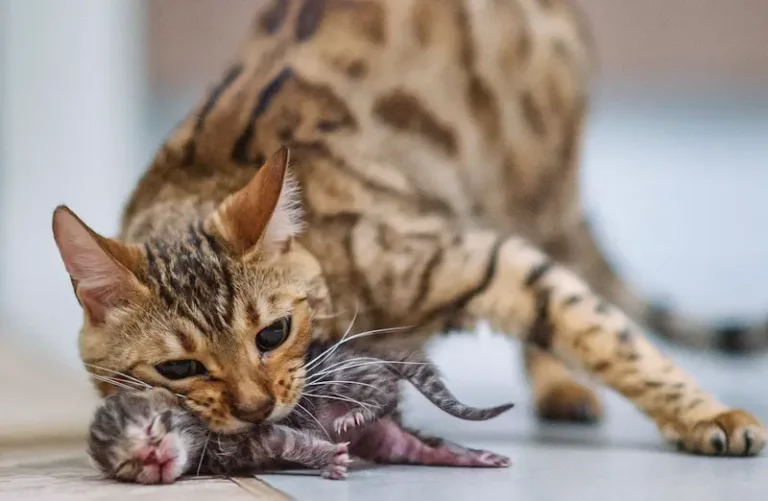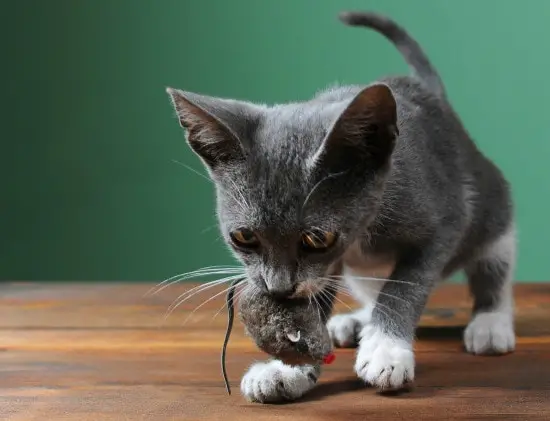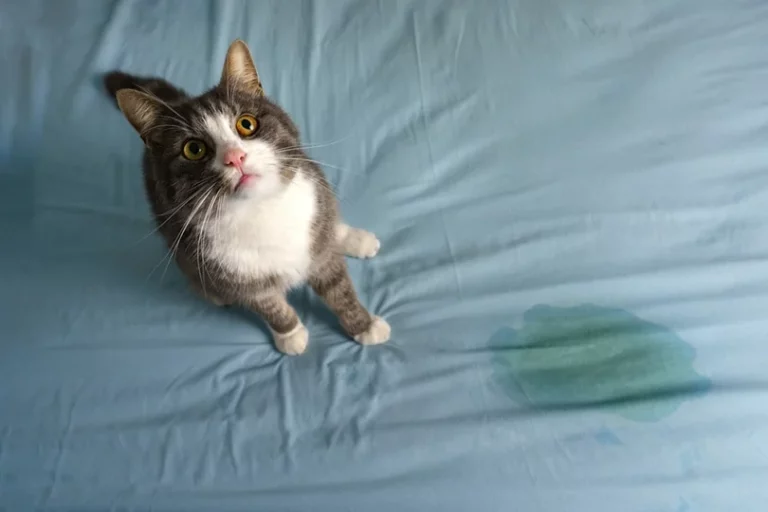Should I Remove a Dead Kitten from Its Mother? (5 Things To Know)
The death of a small kitten can be heartbreaking, but it is important to consider whether or not to remove the deceased kitten from its mother.
Weighing the risks and benefits involved in this decision is essential to ensure that both the mother cat and other kittens are cared for in the best possible way.
Let’s just say the expert advice on this one is mixed.
Bornforpets.com recommends not removing a dead kitten from its mother as this can be stressful for the mother cat. They say it’s best to let nature take its course and allow the mother cat to experience the necessary stages of grief.
In some cases, the mother may still care for and even nurse her dead kitten which can be a natural part of her healing process. They suggest, if possible, it’s best to provide her with a quiet corner where she can grieve without disruption.
While 21cats.org recommend that the dead kitten be removed from its mother immediately by an experienced veterinarian or animal care professional, out of respect for the mother and her remaining kittens.
Each situation is going to warrant a different approach. Here are some things you should know that should help you make the right decision for you and your mother cat…
Key takeaways
Remove a dead kitten to prevent infections.
The mother cat’s behavior dictates the removal process.
If removal causes distress, proceed discreetly.
Dead kittens can spread diseases, prompt removal is essential.
Always consult a vet for advice on handling the situation.
Allow the mother cat time to grieve.
Monitor the mother and remaining kittens’ health and behavior.
Remove a Dead Kitten from Its Mother, or Not? Here’s What You Should Know!
1. Understanding Grief in Cats
Grief in cats is often overlooked and misunderstood. Mother cats may demonstrate signs of mourning, such as heightened vocalizations, intermittently searching the deceased kitten’s body, or avoiding contact with other kittens.
Removing the dead kitten from its mother can be beneficial if the mother appears to be obsessively searching for or vocalizing to the deceased kitten but should be done with caution – sudden removal can cause further distress for a grieving mother cat.
2. Assessing a Kitten’s Death
Before attempting to remove a deceased kitten from an animal care facility or its mother, it’s important to assess whether the death was natural or unexpected.
Natural deaths are usually sudden but can take days in some cases. Unexpected deaths are often the result of extreme trauma or infection, caused by a lack of adequate nutrition and veterinary care.
If the death appears to be unexpected and the health of the remaining kittens is at risk, immediate measures must be taken to ensure their safety and well-being.
3. Deciding If a Removal is Necessary
Deciding whether or not to remove a deceased kitten from its mother can be a difficult decision.
In most cases, it is better to allow the mother to grieve, but if the death was unexpected or there is an infectious disease present, removal may be necessary.
If the remaining kittens are at risk of infection due to debris in their bedding or environment, disinfection and removal should take place.
It may also be best to separate seriously ill kittens so they receive proper care or have their suffering minimized.
Ultimately, the decision should weigh benefits and risks involved with removing the deceased kitten against allowing them time to grieve.
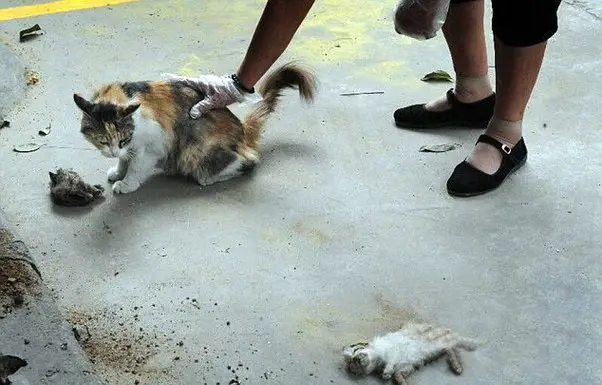
4. Preparing for Removal of the Deceased Kitten
Before proceeding with removal, it’s important to take the necessary precautions and create a safe environment.
Have a bag, towel, or blanket ready to wrap the deceased kitten in and be prepared to protect yourself from potential exposure to any infectious agents.
It’s also essential to give your cat time and space before attempting to remove the deceased kitten, as cats can become aggressive if they feel threatened or disrespected during this difficult time.
5. Helping the Mother Cat Deal with Loss and Grief
It is important to recognize the physical stress and mental anguish the mother cat will experience when losing a kitten.
Allow her to grieve by providing her with a safe and secure space. As cats are very territorial, separate her from any other animals or people.
Offer her comfort through petting and talk to her in a calm reassuring voice. Additionally, some may find it helpful to spend extra time towards providing enrichment activities for their feline companion.
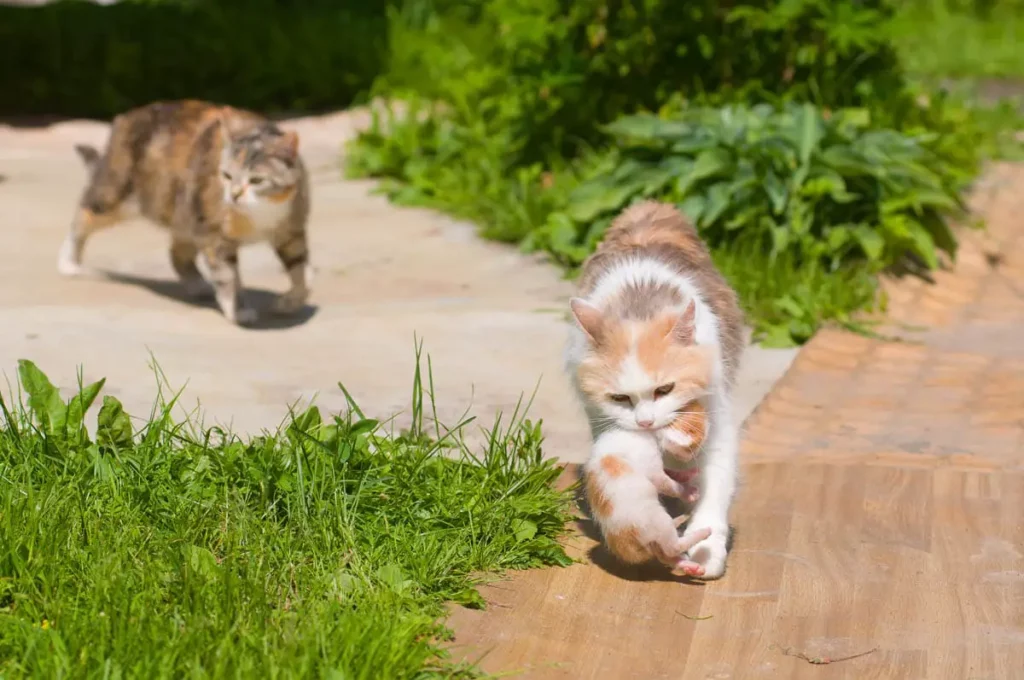
Frequently Asked Questions
What do you do with a dead baby kitten?
If you find a dead baby kitten, the best thing to do is to contact your local animal control or veterinarian for assistance.
Your vet may be able to recommend an appropriate way to bury the kitten and should be able to offer advice about how to cope with the loss.
It’s also important to make sure you correct any risk factors that may have caused the death so that other animals in your care remain safe.
What do mom cats do when their kitten dies?
When a mother cat loses a kitten, she may spend some time searching for them. She will often call out for the missing kitten and look in places it usually naps or under furniture.
If she is unable to find her kitten, she may become agitated and obsessively groom herself or the remaining kittens. Once the mourning process has passed, which can take a few days, she may start to accept that their kittens are gone.
Should I show my cat her dead kitten?
No, it is not recommended to show your cat her dead kitten as this may cause her to become distressed and have a negative reaction.
If possible, try to keep the area where the kitten was found or passed away from her sight. If she does not know about it, then she will likely remain less distressed.
How to remove a dead kitten from its mother?
It is important to be gentle when removing the dead kitten from its mother. Start by gently lifting the kitten away from the mother, taking care not to cause her any pain or distress.
Then use some soft cloths or blankets as a barrier between your hands and the kitten, if necessary. Once it has been removed, place it on a flat surface and cover it with a cloth until you are ready to dispose of it appropriately.
How to dispose of a dead kitten?
If you have found a dead kitten, the best way to dispose of it is by burying it. Using gloves, carefully pick up the body and place it in an appropriate container for burial.
You should choose a location that is both available and inconspicuous, away from areas of high foot traffic or anywhere else where your pet may be disturbed.
It is important to observe local laws when disposing of animal remains, so be sure to look into what regulations are in place before handling the body.
How to revive a dead kitten?
If you have found a non-breathing kitten, the first step is to perform CPR. Lay the kitten on its right side, with its head slightly lower than its body. Cover the kitten’s nose and mouth with your mouth and blow softly until you see the chest rise.
Check for breathing and a heartbeat. If there is none, continue performing chest compressions while gently blowing air into the kitten’s lungs until it starts breathing on its own again. Seek medical attention immediately if unsuccessful.
What is a newborn kitten’s survival rate without a mother?
The survival rate of abandoned kittens without their mothers is low. Without access to their mother’s milk, kittens are susceptible to dehydration and hypothermia, both of which can be fatal.
They also can suffer from malnutrition if they do not receive appropriate nutrition. If orphaned kittens are placed in a foster home with consistent attention, warmth, and adequate nutrition, they have a good chance of thriving.
Do cats mourn the death of their kittens?
Yes, cats can and do mourn the death of their kittens. Though it is not yet fully understood by scientists, cat parents have seen that mother cats become withdrawn and may show signs of depression after losing a kitten. Some even stop eating or care for other kittens in their litter as a way to cope with the loss.
Final Words on Should I Remove a Dead Kitten from Its Mother
“Should I remove a dead kitten from the litter?”
As mentioned in the intro, the advice is mixed. It’s best to assess the situation and see how mother is coping before making a decision. At the end of the day, the kitten will have to be remove. The question is more about the timing.
I hope you found this article helpful.
Please leave a comment if you have any questions/feedback.
Thanks for reading!

![Why Does My Cat Like To Smell My Breath? [4 Reasons]](https://www.warmlypet.com/wp-content/uploads/2023/01/Why-Does-My-Cat-Like-To-Smell-My-Breath.webp)
